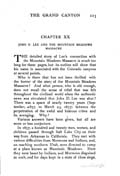
[p. 223]
CHAPTER XX
JOHN D. LEE AND THE MOUNTAIN MEADOWS MASSACRE
THE detailed story of Lee’s connection with the Mountain Meadows Massacre is much too long for these pages, but its outline will show that his name is associated with the Colorado canyons at several points.
Who is there that has not been thrilled with the horror of the story of the Mountain Meadows Massacre? And what person, who is old enough, does not recall the sense of relief that was felt throughout the civilized world when the authentic news was circulated that John D. Lee was shot? There was a space of nearly twenty years (September, 1857, to March 23, 1877) between the perpetration of the awful and hideous crime and its avenging. Why?
Various answers have been given, but all are more or less conjecture.
In 1857, a hundred and twenty men, women, and
children passed through Salt Lake City on their
way from Arkansas to California. They met with various diiiiculties from Mormons and Indians, and,
on reaching southern Utah, were directed to camp
at a place known as Mountain Meadows. Here
they were beset by Indians, and Mormons disguised
as such, and for days kept in a state of close siege,
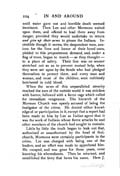
[p. 224]
until water gave out and horrible death seemed
imminent. Then Lee and other Mormons waited
upon them, and offered to lead them away from
danger, provided they would undertake to return
and give up their arms to please the Indians.
Incredible though it seems, the despondent men, anxious
for the lives and honor of their loved ones,
yielded to this preposterous demand, and, under a
flag of truce, began to march—as they thought—
to a place of safety. Their line was no sooner
stretched out so as to prevent mutual help, when
they were set upon by the fiends who had pledged
themselves to protect them, and every man and
woman, and most of the children, were ruthlessly
butchered in cold blood.
When the news of this unparalleled atrocity reached the ears of the outside world it was stricken with horror, followed with a fierce rage which called for immediate vengeance. The hierarch of the Mormon Church was openly accused of being the instigator of the crime. He denied either knowledge of or participation in it, except that a report had been made to him by Lee as Indian agent that it was the work of Indians whose fierce attacks he and other members of the church had sought to restrain.
Little by little the truth began to leak out that,
authorized or unauthorized by the head of their
church, Mormons were certainly participants in the
crime. Lee was charged with being one of the
leaders, and an effort was made to apprehend him.
He escaped, and was gone for three years, none
knowing his whereabouts. Then he returned, and
established the ferry that bears his name. Here J.
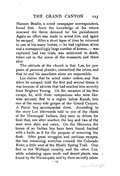
[p. 225]
Hanson Beadle, a noted newspaper correspondent,
found him. Soon the knowledge of his return
renewed the fierce demand for his punishment.
Again an effort was made to arrest him, and again
he escaped. After a short lapse of time he returned
to one of his many homes,— he had eighteen wives
and a correspondingly large number of homes,—was
captured, had two trials, was sentenced to death,
taken out to the scene of the massacre, and there
shot.
The attitude of the church is that Lee, for purposes of personal plunder, committed the crime, and that he and his associates alone are responsible.
Lee claims that he acted under orders, and that
when he escaped, both the first and second times, it
was because of advices that had reached him secretly
from Brigham Young. On the occasion of his first
escape, he, with three companions who were likewise
accused, fled to a region below Kanab, into
one of the many side gorges of the Grand Canyon.
A Paiuti boy accompanied them. According to
the story Lee afterwards told to one of the chiefs
of the Havasupai Indians, they were so driven for
food that, one after another, the boy and two of the
men were slain and eaten. On the Shinumo the
bones of an Indian boy have been found, hacked
with a knife, as if for the purpose of removing the
flesh. After great struggles and perilous escapes,
the two remaining wretches crossed the Colorado
River, a little west of the Mystic Spring Trail. One
fled to the Wallapai country, and the other, Lee,
while subsisting upon seeds and desert plants, was
found by the Havasupais, and by them secretly taken
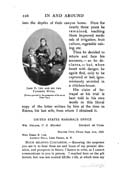
[p. 226]
into the depths of their canyon home. Here for
nearly three years he remained, teaching
them improved methods of irrigation, fruit
culture, vegetable raising, etc.
John D. Lee and His Two Favorite Wives. [From a portrait in the possesion of his son at Tuba City.]
Then he decided to return and face his accusers,— so he declares,—but, when beset with danger, he again fled, only to be captured at last, ignominiously secreted in a chicken-house
His claim of betrayal at his trial best told in his own words in this literal copy of the letter written by him at the time to Emma, his last wife, from whom I obtained it.
UNITED STATES MARSHAL'S OFFICE
WM. Nelson, U. S. Marshal. District of Utah.
Beaver City, UTAH, Sept. 21st, 1876.
Mrs. Emma B. Lee. Lonely Dell, Lees Ferry, A. T.MUCH BELOVED COMPANION,—Knowing the suspense
you are in to hear from me and learn of my present situation
and prospects in future, I hasten to write, as I cannot
communicate to you in person. I reached here on the 4th
instant, but was not wanted till the 11th, at which time my
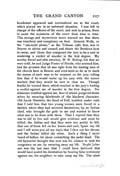
[p. 227]
bondsmen appeared and surrendered me to the court,
which placed me in an awkward situation. I was left in
charge of the officers of the court, and sent to prison, there
to await the summons of the court from time to time.
This strange and mysterious move warned me that there
was treachery and conspiracy on foot. General Wells, or
the "one-eyed pirate," as the Tribune calls him, was in
Beaver, to advise and council and direct the Brethren how
to swear, and those that composed the jury to be a unit in
rendering a verdict of murder in the first degree. My
worthy friend and able attorney, W. W. Bishop, felt that we
were sold; he and judge Foster of Pioche, who assisted him,
had the promise that all was right from the leading men of
the church here in Beaver, and even went so far as to mark
the names of each man to be retained on the jury, telling
him that if he would make up his jury with the names
marked that they would be sure to clear me. Though
fearful,he trusted them, which resulted in the jury’s finding
averdict against me of murder in the first degree. Six
witnesses testified against me, four of whom purgered themselves
by swearing falsehoods of the blackest character.
Old Jacob Hamblin, the fiend of Hell, testified under oath
that I told him that two young women were found in a
thicket, where they had secreted themselves, by an Indian
chief, who brought the girls to me and wanted to know
what was to be done with them. That I replied that they
was to old to live and would give evidence and must be
killed; the Indian said that they were too pretty to kill,
that one of them fell on her knees and said, Spare my life
and I will serve you all my days, that I then cut her throat,
and the Indian killed the other. Such a thing I never
heard of before, let alone committing the awful deed. The
old hypocrite thought that now was his chance to reek his
vengeance on me, by swearing away my life. Nephi Johnson
was the last man that I could have believed that
would have sealed his damnation by bearing false testimony
against me, his neighbor, to take away my life. The other
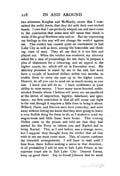
[p. 228]
two witnesses, Knights and McMurdy, swore that I committed
the awful deeds, that they did with their own wicked
hands. I own that I am perfectly whiped out, and have come
to the conclusion that some men will swear that black is
white, if the good Brethren only said so. But my expressing
my feelings in this way will not change the verdict against
me. This verdict has caused quite an excitement in Salt
Lake City as well as here, among the honorable and thinking
class of men. They all say that it is too thin and
played out. When the verdict was rendered, my attorney
asked for a stay of proceedings for ten days, to prepare a
plea of abatement for a rehearing, and an appeal to the
higher courts, etc. which will sit in December next. My
attorney promises to stand by me to the end, but must
have a couple of hundred dollars within two months, to
enable them to carry my case up to the higher courts.
Dearest, do all you can to send me as much money as you
can. I know you will do so. I have confidence in your
ability to raise money. I have many warm-hearted, noble-
minded friends, whom I believe will never see me sacrificed
at the shrine of imposition, bigotry, falsehood, and ignorance;
my firm conviction is that all will come out right
in the end, though it requires a little time to bring it about.
Willard, Harie, and Darrow were here yesterday, and went
away without letting me know that they were going to leave,
a very foolish thing for them to do, as I wished to send my
wagon-team and little Isaac back home. This evening
Hellen came to the prison and told me that they had
started for the Ferry to inform you and Rachel, and to
bring Rachel. This, as I said before, was a strange move,
but I suppose they thought from the verdict that all that
wish to see me must come soon. This, of course, confuses
my intended arrangements. I will have to wait until I
hear from them before making a move in that direction;
in all probability I will be sent to Salt Lake Prison, as the
supreme court sits in Salt Lake City. Dearest Emma,
keep up good cheer. Say to friend Johnson that he must
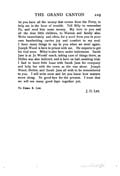
[p. 229]
let you have all the money that comes from the Ferry, to
help me in the hour of trouble. Tell Billy to remember
Pa, and send him some money. My love to you and
all the dear little children, to Warren and family also.
Write immediately and often, for a word from you in your
own handwriting carries joy and comfort to my soul.
I have many things to say to you when we meet again.
Joseph Wood is here in prison with me. He expects to get
his trial soon. Miley is also here under indictment. Sarah
Jane is at Jo Woods' ranch, taking care of things there, as
Hellen was also indicted, and is here on bail, awaiting trial.
I had to leave little Isaac with Sarah Jane for company
and help her with the cows, as she was alone. Joseph
Wood, Hellen, and Sarah Jane all wish to be remembered
to you. I will write soon and let you know how matters
move along. So good-bye for the present. I trust that
we will see many good days together yet.
TO EMMA B. LEE. J. D. LEE.